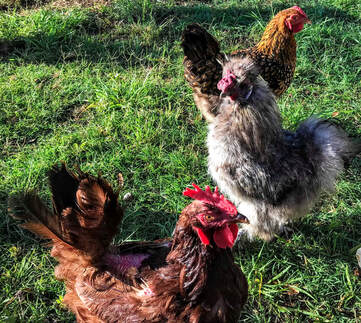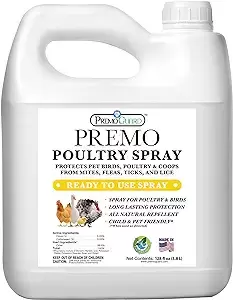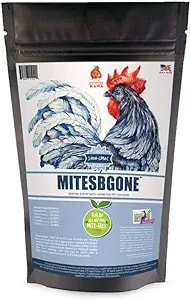Chicken parasites-signs, symptoms, and treatments. Mites and lice,infest chicken coops, perches, bedding and nests, walls, and floors. When your chickens roost at night the mites and lice come out to feed on your chickens. As a responsible chicken owner it is important that you pre-treat Your Chickens for Lice and Mites The old saying "An ounce of prevention is worth a pound of cure" is applicable when it comes to treating chickens for lice, mites, flea,and worms. Scroll down to see a list of parasites (mites, lice, and worms) and find out how to get rid of them.
Signs of Poultry Mites and Lice

Signs of Poultry Mites and Lice:
It is best to check your coop and chickens on a weekly basis for signs of poultry mites and lice. Use a magnifying glass to help you spot mites and lice easily. It is so much easier to get rid of mites and lice if you catch the early signs of it. Once infested you will have much more work to do.
Signs of mite and lice infestations in chickens are:
It is best to check your coop and chickens on a weekly basis for signs of poultry mites and lice. Use a magnifying glass to help you spot mites and lice easily. It is so much easier to get rid of mites and lice if you catch the early signs of it. Once infested you will have much more work to do.
Signs of mite and lice infestations in chickens are:
- Feather loss, feather plucking (bird pulls his or her own feathers out)
- Pale comb and wattles
- Dirty or crusty vent area
- Listless
- Dull droopy feathers/bald spots/evidence of feather pulling/broken feathers
- Change in appetite/weight loss
- Reddish skin or spots
- Loss in egg production
- Seeing insects during physical inspection
How to Prevent Mite and Lice Infestations on Your Chickens and In Coops
Prevention is the key to preventing mite and lice infestations in chickens.
Keep bedding clean and change often
Clean coop and bedding often. How often you need to clean your coop depends on how many chickens you have. Change bedding often, How often you need to change bedding depends on how many chickens you keep. If you scoop the bedding it will stay fresh much longer and will lower your bedding costs.
Warning! DO NOT TREAT CHICKS UNDER THREE MONTHS OF AGE!!
See more parasite treatments below.
Keep bedding clean and change often
Clean coop and bedding often. How often you need to clean your coop depends on how many chickens you have. Change bedding often, How often you need to change bedding depends on how many chickens you keep. If you scoop the bedding it will stay fresh much longer and will lower your bedding costs.
- Scoop bedding in between changes
- Treat Bedding, feeding areas, coop, and run areas, as well as other birds, livestock, and pets with Food Grade DE
- Provide fresh, loose soil for dirt bathing
- Paint your coop annually
- Pre-treat your chickens and bedding with Food grade DE
Warning! DO NOT TREAT CHICKS UNDER THREE MONTHS OF AGE!!
See more parasite treatments below.
List of Herbs to Improve Your Chickens Health & Keep Mites Away
Herbs that can be used to deter mites and lice in your chicken coop are:
- Wood ashes-Use wood ashes from burned untreated wood in nesting boxes, where they take their dust baths, and in floor bedding to prevent lice and mites.
- Organic Neem Oil can be sprayed on roosts, nest boxes, and perches to get rid of lice and mites.
- A Spicata can be used to treat chickens for lice and mites
- Catnip works as a sedative and as a natural insecticide
- Lavender can be used as an insecticide which also increases blood circulation and is well known as a stress reliever too.
- Lemon balm and lemon rinds can be shredded into nest and coop bedding. Fresh squeezed lemon juice can be sprayed on roosts to repel insects.
- Oregano-Sprinkle on feed to improve health
- Peppermint - anti-parasitic, insecticide
- Sage
- Spearmint-Prevents lice and mites and also has healing properties when fed to your chickens.
- Thyme
More About Chicken Parasites |



